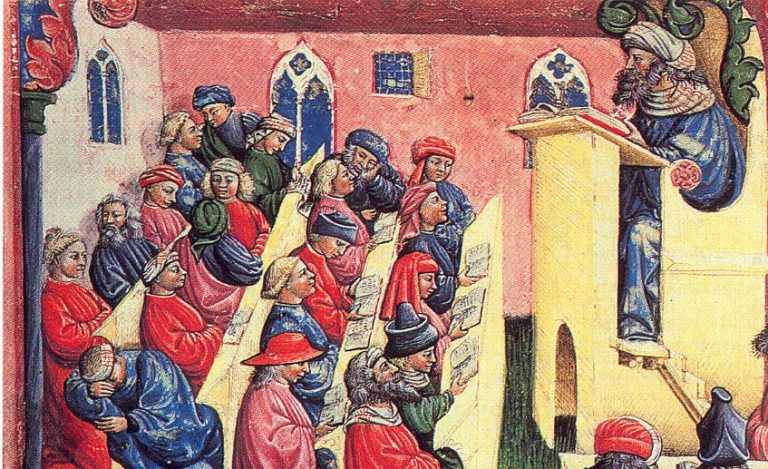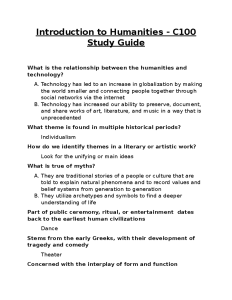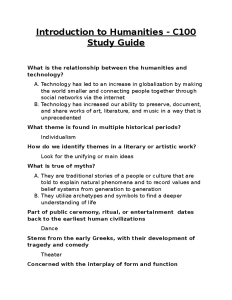The Medieval Studies Conference is a premier event that brings together scholars, educators, and enthusiasts from around the globe to explore the rich tapestry of medieval life and thought. Held annually at Harvard, this conference offers a unique platform for interdisciplinary medieval research, fostering vital discussions that bridge contemporary issues with historical insights. Attendees engage in in-depth workshops, panel discussions, and lectures, highlighting the connections between Geoffrey Chaucer’s literary contributions and modern literature, particularly in understanding the dynamics of rumor and authority in storytelling. With a diverse array of presentations covering topics such as global perspectives on medieval societies, the conference showcases how medieval studies continues to evolve, attracting over 800 participants from 23 countries. This vibrant gathering underscores the importance of both preserving our historical narratives and re-evaluating their relevance in today’s world.
The Medieval Studies Conference serves as a significant hub for researchers and academics dedicated to the examination of the Middle Ages. This event not only highlights the continued relevance of medieval literature but also emphasizes the connections to contemporary themes, such as how Chaucer’s works resonate with modern storytelling and the challenges of misinformation. By fostering interdisciplinary collaboration, the conference offers insights into varied aspects of medieval culture, economy, and literature, drawing contributions from scholars across multiple fields. With a focus on global narratives, this gathering encourages attendees to reconsider traditional paradigms and explore the complexities of medieval societies beyond the western canon. Overall, this unique academic assembly reinforces the expanding scope of research and discourse in medieval studies.
The Significance of the Medieval Studies Conference
The Medieval Studies Conference, held at Harvard University, represents a pivotal gathering for scholars and students alike, showcasing the rich tapestry of medieval research across various disciplines. With over 800 academics from 23 countries participating this year, the conference has solidified its status as one of the most important events for medievalists globally. This convergence of minds not only highlights the breath of medieval scholarship but also fosters exchange and collaboration among scholars with different academic backgrounds.
As we delve into discussions from workshops to plenary sessions, the conference illustrates the evolution of medieval studies over the past century. From Geoffrey Chaucer’s reflections on societal issues centuries ago to current interdisciplinary approaches, it is evident how the field has expanded. Participants like Fernanda García-Oteyza emphasize this progression by linking medieval literature with modern narratives, showing the ongoing relevance of these themes in today’s discourse.
Interdisciplinary Approaches in Medieval Studies
One of the most exciting aspects of the Medieval Studies Conference is its commitment to interdisciplinary research. This year’s event showcased a diverse range of topics, spanning medieval trade agreements to artistic expressions, reflecting the multifaceted nature of the medieval world. Presentations such as Elena Shadrina’s on Venetian merchants and Colin Brady’s reviving of the Óenach Tailteann demonstrate how scholars are drawing from diverse methodologies to enrich our understanding of the medieval period.
Moreover, interdisciplinary work fosters innovation and fresh perspectives within the field of medieval studies. Each presenter plays a role in reshaping our comprehension of history by intertwining insights from various academic backgrounds. The interconnections fostered at this conference encourage new questions and explorations, promoting a dynamic intellectual environment dedicated to the growth of knowledge.
Global Perspectives on Medieval Research
This year’s Medieval Studies Conference placed a robust emphasis on global perspectives, defining the future landscape of medieval studies as we venture into broader narratives and varied sociocultural contexts. Researchers presented papers that challenged Eurocentric definitions of the medieval era, examining societies from Africa to East Asia. Such global engagement opens new avenues for understanding the interconnectedness of cultures during the medieval period, suggesting a mosaic of narratives rather than a singular storyline.
The inclusion of global perspectives in the conference agenda not only highlights the complexities of medieval societies but also emphasizes the necessity for contemporary scholars to acknowledge these diverse histories. Workshops like the one led by Assistant Professor Anna Wilson on teaching the Global Middle Ages serve as essential platforms for graduate students to learn about incorporating global contexts into their research, fostering a richer and more nuanced understanding of medieval studies.
Engagement Through Workshops and Panels
Workshops and panels at the Medieval Studies Conference serve as crucial venues for intellectual exchange, fostering an environment where ideas can be shared, critiqued, and refined. Attendees, including prominent figures in the field, engage in discussions that challenge traditional methodologies while encouraging innovative approaches to medieval scholarship. Such interactions are invaluable for early-career scholars, as they provide opportunities to network and gain insights from seasoned academics.
A highlight of the conference is the participation of graduate students who, like Emily Sun, appreciate the chance to remove themselves from digital communication and engage in meaningful conversations. These interactions not only enhance their scholarly development but also build a sense of community within the field of medieval studies, underscoring the importance of personal connections in academia.
The Legacy of Harvard in Medieval Studies
As a foundational site for medieval academic discourse, Harvard University has played a significant role in shaping the landscape of medieval studies for the past century. The return of the Medieval Academy of America to Harvard serves as a nostalgic yet forward-looking reminder of the institution’s strength in fostering medieval scholarship. The legacy of past conferences informs current dialogues, bridging decades of scholarly conversation and setting the stage for future explorations.
This historical context is critical as it provides scholars with a framework to understand both the origins and the evolution of medieval studies. Sean Gilsdorf’s reflections on these milestones encourage attendees to consider not just where the field has been, but where it is headed. Such introspection at the conference symbolizes the scholarly community’s commitment to continuously adapt and redefine the parameters of medieval research.
Chaucer’s Relevance in Modern Literary Discussions
Geoffrey Chaucer’s works continue to resonate in contemporary literary discussions, as seen in the insights shared by Fernanda García-Oteyza at the conference. Chaucer’s exploration of themes such as rumor and reality lays the groundwork for modern dialogues about authorship and the nature of truth. By paralleling Chaucer’s critiques with contemporary literature, scholars illuminate the enduring relevance of medieval texts, suggesting that literature transcends time and remains a crucial lens through which to examine current societal issues.
Moreover, the engagement with Chaucer’s legacy in modern contexts fosters a rich dialogue among attendees. Scholars like García-Oteyza contribute to redefining literary canons, encouraging a deeper understanding of how medieval literature informs and shapes our contemporary narratives. This ongoing engagement with Chaucer not only enriches medieval studies but also solidifies its place within broader literary scholarship.
Medieval Studies and Digital Humanities
The intersection of medieval studies and digital humanities finds a prominent place in discussions at the conference, highlighting how digital tools can enhance research and broaden access to historical materials. Scholars are increasingly utilizing technology to analyze texts and visualize medieval data, creating interactive resources that allow for a more comprehensive exploration of the past. This methodological shift reflects a significant transformation in how medievalists engage with their material.
The integration of digital humanities within the realm of medieval studies serves not only as an innovative approach but also as a means to reach wider audiences. Workshops focused on these methodologies encourage researchers to consider how digital platforms can facilitate collaboration and dissemination of scholarship. By embracing digital tools, the medieval studies community can preserve and present its findings in ways that resonate with contemporary society.
Networking and Collaborative Opportunities
Networking at the Medieval Studies Conference is an invaluable aspect that extends beyond the immediate scope of presentations and panels. This event creates a dynamic environment for collaboration, as researchers from diverse backgrounds come together to share insights, ideas, and potential partnerships. The festival-like atmosphere fosters interactions that allow attendees to cultivate relationships that can lead to future collaborative projects.
As evidenced by the experiences shared by students and established scholars alike, the benefits of networking at such conferences are profound. Attendees leave not only with an expanded professional network but also with new perspectives on their research topics. This sense of community and shared purpose invigorates the field and encourages ongoing dialogue and cooperation among scholars.
The Future of Medieval Scholarship
Looking toward the future, the Medieval Studies Conference serves as a crucial platform for contemplating the direction of medieval scholarship. Discussions about the trajectory of the field, as articulated by Sean Gilsdorf and other participants, underscore the importance of being proactive in addressing contemporary challenges faced by scholars. The inquiries posed at the conference empower attendees to envision new paths and methodologies that resonate with current academic landscapes.
The commitment to expanding the scope of medieval studies, to embrace global perspectives and interdisciplinary approaches, signals a vibrant future for the field. As scholars continue to gather to share their findings and innovations, the Medieval Academy remains an essential fixture in fostering an environment where medieval studies can flourish and adapt to the ever-changing contours of academia.
Frequently Asked Questions
What is the Medieval Studies Conference?
The Medieval Studies Conference, organized by the Medieval Academy of America, is an annual gathering that serves as a pivotal event for scholars in the field of medieval studies. It features workshops, presentations, and discussions on a wide range of topics related to medieval literature, history, and culture.
How does the Medieval Studies Conference promote interdisciplinary medieval research?
The Medieval Studies Conference promotes interdisciplinary medieval research by bringing together scholars from diverse fields such as history, literature, art, and cultural studies. This year’s conference showcased over 500 speakers, reflecting the collaborative spirit of medieval studies and highlighting global perspectives on the medieval era.
What notable topics were discussed at the recent Medieval Studies Conference at Harvard?
At the recent Medieval Studies Conference held at Harvard, notable topics included the connections between Geoffrey Chaucer’s works and modern literature, medieval trade agreements, and global perspectives on societies from the Mediterranean to Africa and Asia, emphasizing the breadth and depth of medieval studies.
Who were some of the presenters at the Medieval Studies Conference?
The Medieval Studies Conference featured presentations from numerous scholars, including Fernanda García-Oteyza, who explored the relationship between rumor and truth through Chaucer and modern literature, and Colin Brady, who discussed the revival of the Óenach Tailteann, a 10th-century Irish festival.
How has the Medieval Studies Conference evolved over the past 100 years?
The Medieval Studies Conference has evolved significantly over the past century, expanding its scope to include global perspectives on medieval studies. This year’s centennial meeting at Harvard marked a return to its roots, showcasing the growth of interdisciplinary research and diverse scholarly approaches within medieval studies.
What is the significance of the theme ‘global perspectives on medieval’ at the Medieval Studies Conference?
The theme ‘global perspectives on medieval’ at the Medieval Studies Conference underscores the importance of studying medieval history and literature through a worldwide lens, encompassing various cultures and regions. This approach encourages scholars to examine the interconnectedness of medieval societies across continents.
How can graduate students benefit from attending the Medieval Studies Conference?
Graduate students benefit from attending the Medieval Studies Conference by gaining opportunities to present their research, network with established scholars, and engage in discussions that broaden their understanding of medieval studies, enhancing their academic and professional development.
Is the Medieval Studies Conference open to the public?
While primarily geared towards academics and scholars, certain sessions at the Medieval Studies Conference may be open to the public. Attendees can check the official conference schedule for details on public lectures, exhibits, and discussions.
What makes the Medieval Studies Conference a key destination for medievalists?
The Medieval Studies Conference is a key destination for medievalists due to its long-standing history of fostering scholarly dialogue, the quality of its key speakers, and the chance to network with peers and experts globally. It serves as a platform for sharing pioneering research in medieval studies.
How does the Medieval Studies Conference facilitate communication between scholars?
The Medieval Studies Conference facilitates communication between scholars through a mix of plenary sessions, workshops, and informal networking opportunities. These settings allow scholars at all levels to exchange ideas, share research findings, and collaborate on future projects in medieval studies.
| Key Points |
|---|
| The Medieval Academy of America celebrated its 100th annual meeting in March 2025, drawing over 800 medievalists from 23 countries. |
| The conference took place at Harvard University, marking the return of the Academy’s meeting to its historical roots after 50 years. |
| Discussions at the conference included themes on misinformation, exploring links between Geoffrey Chaucer and contemporary literature. |
| Research presentations featured a variety of topics, including medieval trade agreements, cultural festivals, and modern translations of classic texts. |
| A focus on global perspectives in medieval studies included workshops encouraging a broader understanding of medieval societies beyond Europe. |
Summary
The Medieval Studies Conference has successfully demonstrated the vitality and evolution of medieval studies over the past century. From its humble beginnings to becoming a global gathering of enthusiasts and scholars, this year’s conference not only revisited historical reflections but also projected future directions within the field. With robust discussions and innovative research presentations, the conference reinforced the importance of collaboration and interdisciplinary approaches. As we look forward, the insights shared during this gathering will undoubtedly inspire scholars to continue exploring the rich complexities of the medieval world, ensuring a dynamic future for medieval studies.




